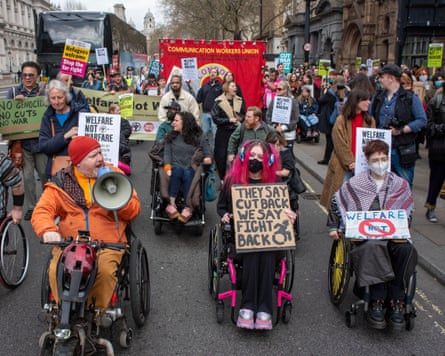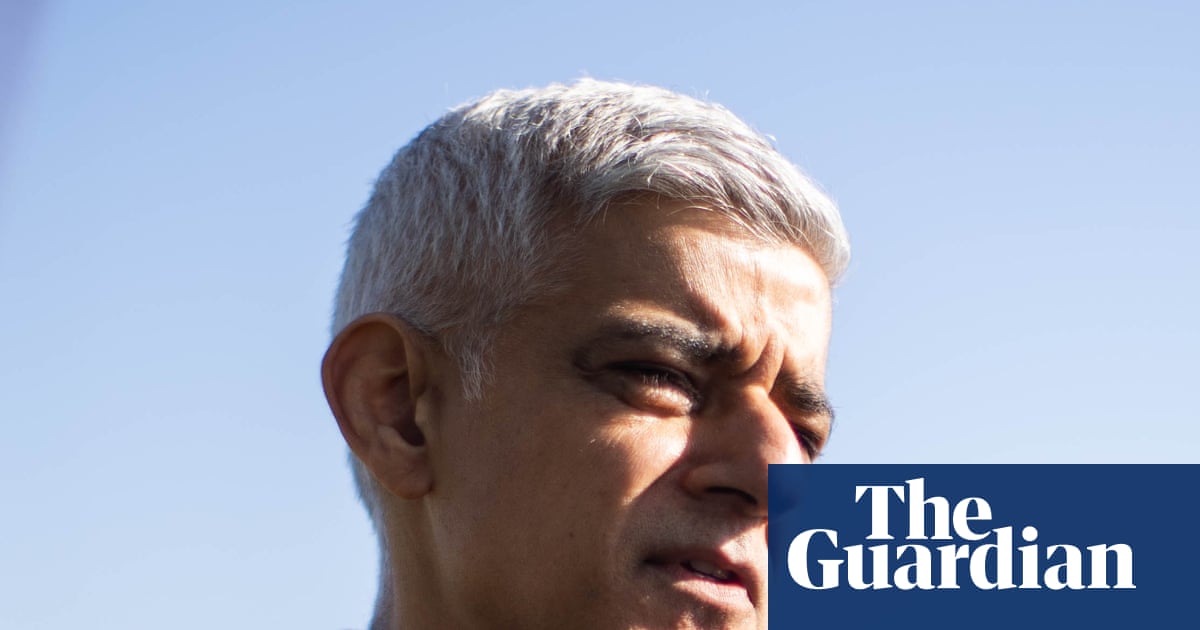Keir Starmer is battling to stem the revolt over his cuts to disability benefits, with about 50 Labour MPs concerned the concessions will create a “two-tier” system where existing and newly disabled people are treated differently.
Senior government sources insisted things were “moving in the right direction” for No 10, with the whips calling round backbenchers to persuade them to get behind the bill on Tuesday.
Government insiders believe they have peeled off enough of the 120-plus opponents of the legislation to win the vote, after the work and pensions secretary, Liz Kendall, promised to exempt current disability claimants from the changes, and increase the health element of universal credit in line with inflation.
However, rebel MPs will attempt to lay a new amendment on Monday giving colleagues a chance to delay the bill, which will still involve £2.5bn of cuts to future disability benefits.
The continuing row over the reforms will likely blight the week that will mark the first anniversary of Labour’s return to power.
In an interview yesterday, Starmer admitted to a range of mistakes – including using the phrase “an island of strangers” in an immigration speech, and of hiring his former chief of staff Sue Gray.
His government has made a series of U-turns in the last 12 months – but his handling of the welfare bill might be the most damaging episode of them all.
Starmer will next week be hoping to draw a line under the difficult period, which has also seen the government reverse cuts to winter fuel payments and change course over holding an inquiry into grooming gangs.
Dozens of Labour MPs are continuing to speak out against the welfare cuts on a Labour WhatsApp group, with many MPs still undecided about how they will vote and pressing for more assurances that it is ethical and legal to set up a division between current and future claimants.
Disability charities are warning that the bill is still “fatally flawed” and will lead to an “unequal future” for different groups of disabled people, making life harder for hundreds of thousands of future claimants.
Starmer defended the bill on Friday, saying it strikes the right balance. The changes will protect 370,000 existing recipients who were expected to lose out after reassessment.
“We talked to colleagues, who’ve made powerful representations, as a result of which we’ve got a package which I think will work, we can get it right,” the prime minister said.
Asked how the government would pay for the £3bn of concessions, which experts believe will have to be funded by tax rises or extra borrowing, Starmer replied: “The funding will be set out in the budget in the usual way, as you’d expect later in the year.”
There would need to be at least 80 rebels to defeat the bill, and government sources are quietly confident they have given enough ground after Meg Hillier, the chair of the Treasury committee, said she would back the legislation following changes.
However, others are unconvinced. One leading rebel said “everyone but a handful of people is unhappy”, even if they do end up reluctantly backing the changed legislation, while another expressed frustration that No 10 and the whips were “trying to bounce people into agreeing before we’ve seen enough details”.
Rachael Maskell, the Labour MP for York Central, who is one of the leading opponents of the bill, said: “They are going to have to go back to the negotiating table … deaf and disabled people’s organisations [DDPOs] are rejecting these changes as it fails to address future need and gives no security for people with fluctuating conditions, for instance where people are in remission.”

Other critics who plan to vote against the bill include the MP for Crawley, Peter Lamb, who said: “Despite many improvements to the system set out in the bill, at its core the bill remains a cost-cutting exercise. No matter the level of involvement of disability groups in co-producing a scheme for new applicants, to save money the new scheme has to result in people with high levels of need losing the support necessary to wash themselves, dress themselves, and feed themselves.”
after newsletter promotion
Simon Opher, the MP for Stroud, also said he still opposed the bill: “The changes do not tackle the eligibility issues that are at the heart of many of the problems with Pip [personal insurance payments]. The bill should be scrapped and we should start again and put the needs of disabled people at the centre of the process.”
Diane Abbott, a leading figure from the left of Labour, said the rebellion was “far from over”, while another Labour MP said: “The bill starts from the premise of cuts, not reform. It’s also arse about face in terms of impact assessments and co-production. It’s simply a negotiated dog’s dinner. In that sense, nothing has really changed except the fact they’ve negotiated more misguidedly to sign up to it.”
One thing Labour MPs are pushing hard for is more clarity on the review of how the Pip system works, due to be done by the autumn by Stephen Timms, a work and pensions minister. Many expect that process to change the points system from what has been proposed so far. Some in the party also want Starmer to reinstate Vicky Foxcroft, who quit as a whip to vote against the bill before the U-turn was made.
Stella Creasy, a leading Labour MP who had initially signed the amendment to delay the bill, said she wanted to see more details. “The concern is to get to be workable … We need to understand why we would treat one group of claimants differently from another,” she added.
Another Labour MP, from the 2024 intake, said: “I’m waiting to look at the details before making any decisions. Many are in the same place as me and need to get something more than a midnight email on an issue of this much importance to hundreds of thousands of people”.
The Labour MPs opposed the changes are citing a fundamental rejection of the idea that a Labour government will be making disabled people worse off. But at the same time, many of them have also been alienated by what they say is a No 10 operation that is out of touch with how the parliamentary party is feeling, and has tried to strongarm MPs into backing the legislation by threats and promises of preferment.
“Goodwill has been lost and there is still huge suspicion about whether they will try and pull a stunt at the last minute,” said one Labour MP.
The majority of disability charities and campaign groups were on Friday still opposed to the cuts. The disability equality charity Scope said that despite concessions, an estimated 430,000 future disabled claimants would be affected by 2029/30.
Its strategy director, James Taylor, said: “It is encouraging that the government is starting to listen to disabled people and MPs who have been campaigning for change for months. But these plans will still rip billions from the welfare system.
“The proposed concessions will create a two-tier benefits system and an unequal future for disabled people. Life costs more if you are disabled. And these cuts will have a devastating effect on disabled people’s health, ability to live independently or work.”
A coalition, including Disabled People Against Cuts, said: “Disabled people and disability rights groups totally reject the performative politics being enacted by the government, in response to being challenged by a growing MP rebellion and a tidal wave of anger from the public.
“We will not sell out generations of disabled people past and future by accepting this sham of alleged concessions on welfare spending so that they can save face. The reforms are ill thought out, and MPs still do not have a full understanding of their implications and impact.”

.png) 2 months ago
76
2 months ago
76

















































